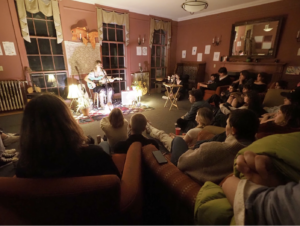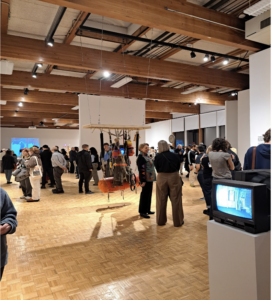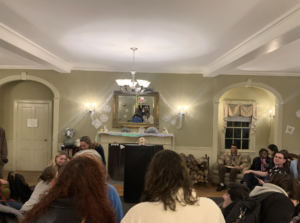It’s through foodways that we engage in a recovery from historical trauma, and promote indigenous healing and self-determination. And when we talk about these things, if some feeling of discomfort arises in you, don’t shut off, but ask yourself why.
- Chef Nephi Craig of the White Mountain Apache Tribe, Gather dir. Rawal
Gather, directed by Sanjay Rawal and released just this September, is a documentary film examining the movement among Native Americans to obtain food sovereignty amidst generational trauma and identity deprivation.
Bennington’s Center for the Advancement of Public Action screened the film on Monday, October 12th for Indigenous People’s Day. The event was held virtually and synchronously in the Storyspaces Screening Room, and appears to have been well-received across the board. Some students found that the film brought them to tears, and although the screening software was controlled by the filmmakers themselves, organizer and Bennington professor Tatiana Abatemarco recalls that a number of community members were utilizing the chat feature of the Room often to discuss the dynamics of the film.
To follow up on the event and illustrate its significance to Bennington, Tatiana Abatemarco graciously agreed to meet me in her office at the Barn on campus. Abatemarco has taught food studies here at Bennington for over a year now, hired from the 2019 Mellon Grant to address the acute food insecurity in southern Vermont.
A “transdisciplinary social scientist and humanist,” Abatemarco’s focus is on student and community involvement, as well as on developing a curriculum that is at least partially accessible to the public. The Gather screening is an example of this.
Abatemarco, in remembering her amazing experience screening Forgotten Farms at Tishman last year, sought another film to show her first-seven-week class, “Understanding Food Insecurity,” in honor of Indigenous People’s Day and as a culmination of the last unit of the course, which centers on indigenous food sovereignty and reparations.
“I think it’s really important for students to explore how our entire food system is based on stolen land and stolen labor,” she explained, “so I was looking for something that fit with that and I found out that this movie Gather was doing these virtual movie screenings, so it fit perfect for what we were trying to do in class.”
In continuing our discussion around settler allyship, Abatemarco emphasized the base-level, and particularly relevant, form of activism: voting. She laughingly stated that “Voting is like brushing your teeth, it should be the most basic habit — you’re not an amazing person for doing it, you’re just kind of like, not gross.”
Despite support from both presidential candidates for the practice of natural gas extraction (a significant threat to indigenous land,) she encourages students to research candidates’ track records on the local, regional, and federal levels alike: “See which candidates are the people who are supporting treaty rights, who are understanding that there are nations of people who lived here before the United States was established and we have agreements with them.”
Bennington College was built on stolen Mohican and Wabanaki land. The El-Nu, a local Abenaki band, devotes most of their time to the historical or living history aspects of Wabanaki culture. Those interested in learning more can visit their event page (http://elnuabenakitribe.org/announcements) and read through the articles written there.
Additionally, Abatemarco has been exploring an “Abenaki seed-saving program that’s kind of spreading throughout the state, and [is] really interested in any students who want to help with that.” Students and other community members would work with the Abenaki to acquire and grow seeds, then give back the seeds and the crops yielded.
The Abenaki in Vermont, like many Indigenous people around the world suffering from colonialism, have extraordinarily high rates of food insecurity. This would be an opportunity to facilitate the expansion of native seeds and native foods back to the people who developed those ancestrally. “Just read and learn, too. Know whose land you’re on. Listen to native voices.”
Students interested in learning more about any of these projects, or just wanting to discuss the issues further, can reach an eagerly waiting Tatiana Abatemarco at tatianaabatemarco@bennington.edu.





Be First to Comment